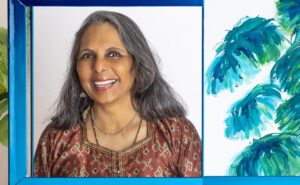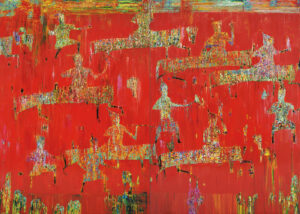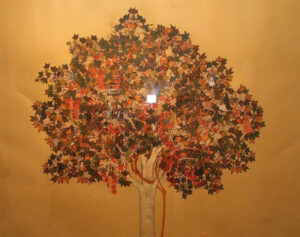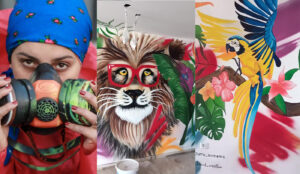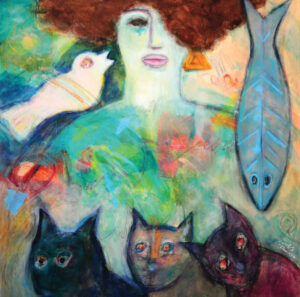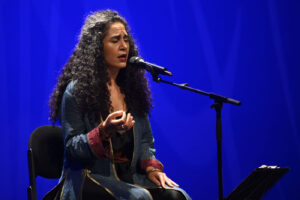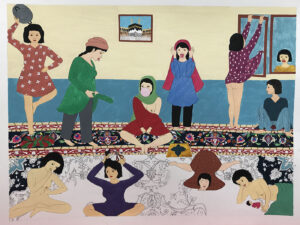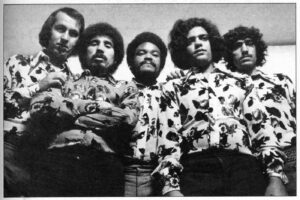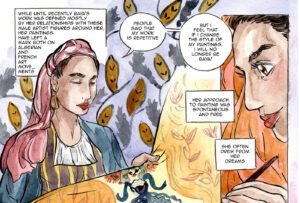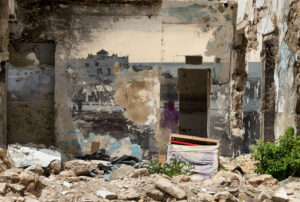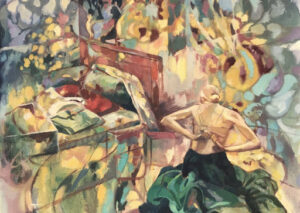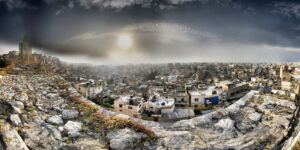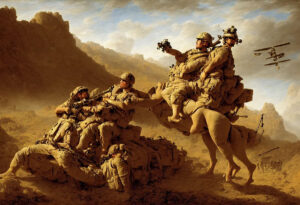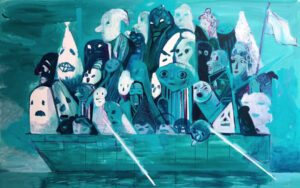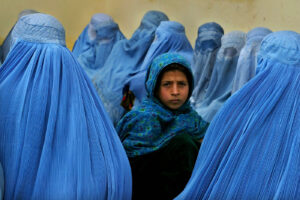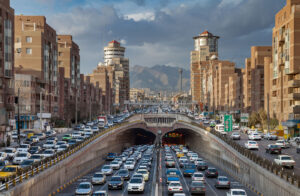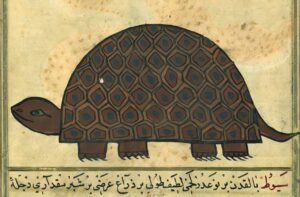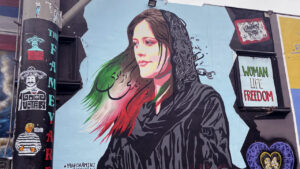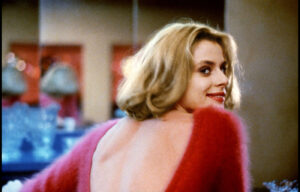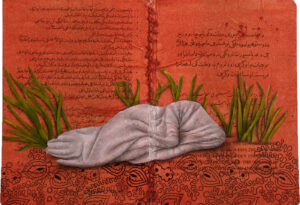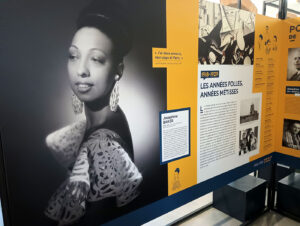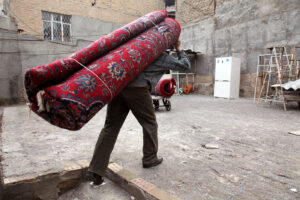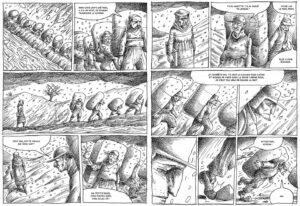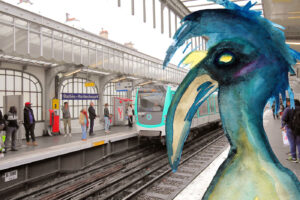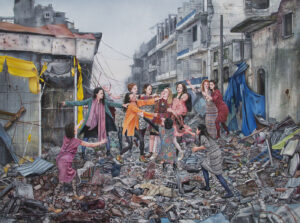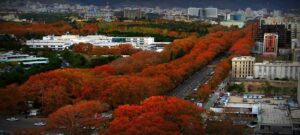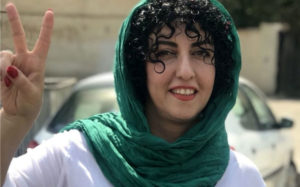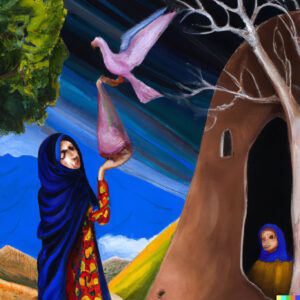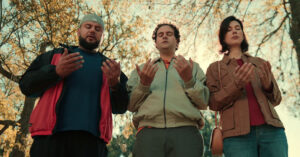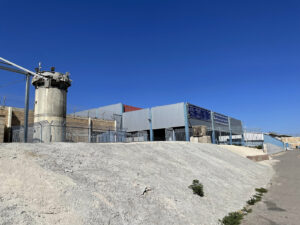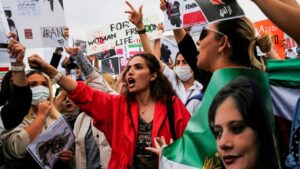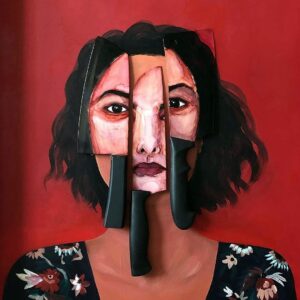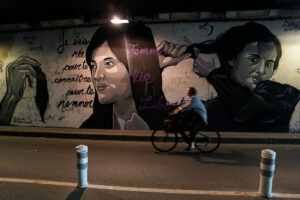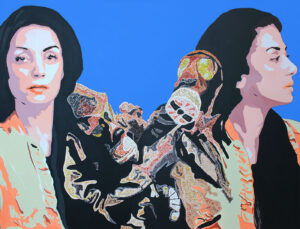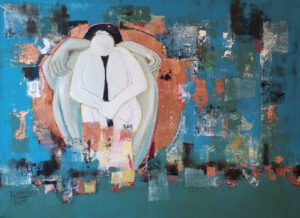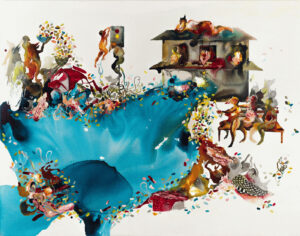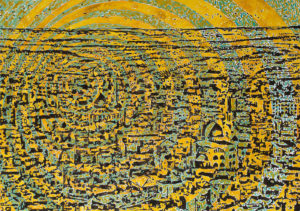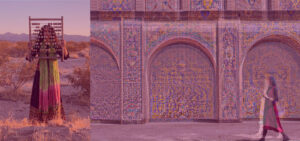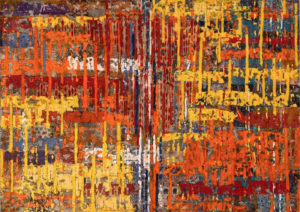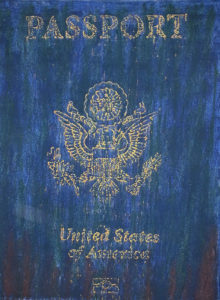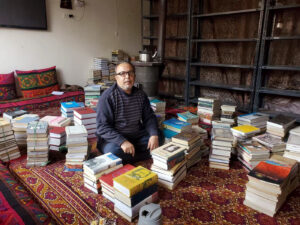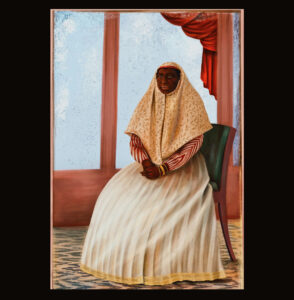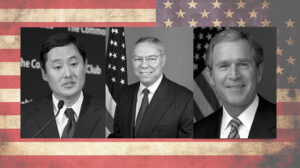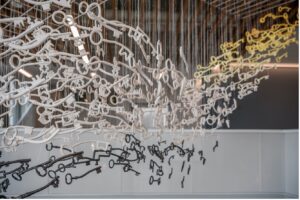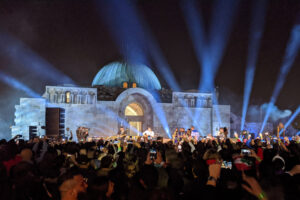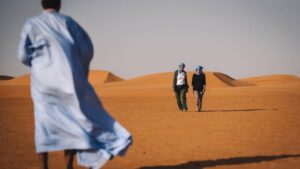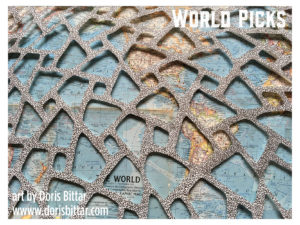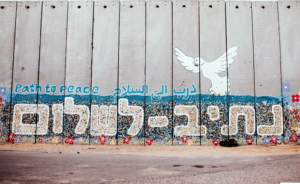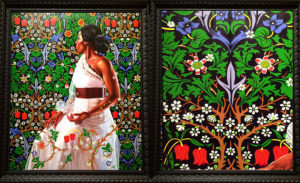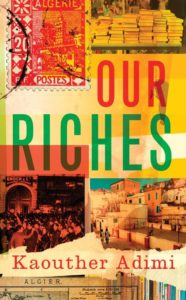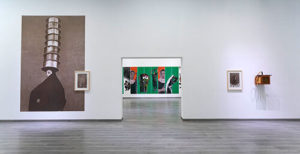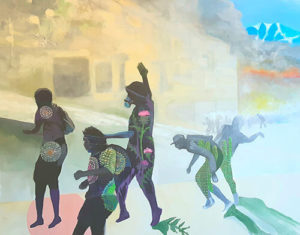A young woman who grew up along the borders of Iran and Afghanistan peels away layers, exploring herself as a writer.
Aliyeh Ataei
And when you’re packing your bags,
Nothing is lighter than love.—Abdellatif Laabi
Starlings fly in flocks. When migrating in the fall, they form captivating curves and awe-inspiring arcs in the sky. If you ever happen to spot them at the time of migration, you’ll see a black flight of birds producing sublime pictures in the sky, their movement no different than that of the stroke of a paintbrush. Starlings follow patterns in nature; no one knows what kind of coordination conjures their beautiful canvases in the sky. Is there, for example, a starling leading the way, or does such supreme discipline happen on its own? It looks like starlings are the most enchantingly rootless creatures when it comes to migration.
“You’re not a tree stuck into the ground,” my dad used to say. “Fly yourself to America and then do whatever the heck you want.” I haven’t been to America, but I’m in Paris. Follow the story from here: I have brought with me a few small objects, and I’m looking for objects other people have packed up in their suitcases and backpacks before leaving their home country. Today, I’m thinking my dad was dealing in bad faith by likening me to a free bird. Just as he would speak casually of my not being a tree, it never occurred to him that he was planting the idea of being “rootless” in my head. I’m not writing this as someone angry and away from her home; you must have noticed that we never nurse a grudge against those of our loved ones who are no longer in this world.
When I opened my suitcase, I realized that every item I could do without had some kind of a love story behind it, and my father surely had no idea about the trials and tribulations I would have to carry on my wings — too many for me to want to lighten my cumbersome suitcase by chucking out a few tiny objects. My heavy suitcase became bearable, thanks to small, inessential items. I discovered that other suitcases scaled at the airport must also be housing small pieces that stand for the ethereality of existence. Therefore, I invite you to read about love in the following vignettes. Love doesn’t always bode well or end well; I’m letting you know in advance that there are no Bollywood-type love stories here. Humans carry love — sometimes like a scar, other times like a mark of stigma on their foreheads. So, pore over the stories of these people who are far from us yet so close, their remoteness resting on geography and their closeness captured in the tiny pieces stowed in our suitcases, harkening back to happiness.
Umbrella: The Filipino family lives in the suburbs of Paris, not where there is a predominantly Muslim population, but a neighborhood reserved for East Asians in the northeastern arrondissement. With the elder daughter in the family threatened by the father, the mother and her two girls, aged 15 and 10, fled the Philippines. The family has, in effect, brought nothing with them except an umbrella in the elder daughter’s care.
The apartment is approximately 430 square feet and is located on the fifth floor of a jerry-built, defaced building whose façade I’m taken aback by when I compare it to other French houses. It looks as if this is a suburb of Pakdasht[1] where they would put together cheapjack and gaudy materials to make a so-called “house.” As soon as I enter, I am repulsed by the stench from the drains — I tell myself, That’s Paris for you. When the door opens, it’s as though I’ve set foot in a local market. A straw basket and a multi-colored plastic hamper hang from the entrance corridor’s ceiling. The living room is lit with a few blinking lights like the ones you’d find at a cheap bar. The furniture is dilapidated but dirt-free, with a diamond-shaped table where short and tall candles sit, as if this were a saqqakhana[2] or a tiny mihrab[3]The family’s mother is plump and agreeable. As soon as I’m in, she grabs my hand and takes me to the girls’ room as if trying to convince a social worker from the immigration office that everything is hunky-dory.
The girls’ room has an aura of gimcrack pomp and pageantry, but that has taken some doing, too. The pink-and-red bedsheets have been washed so strenuously that the scent of detergents is wafting in the air, making it feel like they’d made the beds just two minutes earlier. Right off the bat, I go to my question: “What have you brought with you?”
“An umbrella,” says the younger daughter.
“I was the one who brought it,” says her older sister.
The umbrella is sitting by the lampshade on a small desk flanked by the girls’ beds; it’s a nondescript plastic umbrella with no colors, patterns, or special features — a colorless plastic bag with a gray plastic handle. The mother says that her husband wanted to sell their daughter to a German guy when she was eleven. I’m not sure if this is right or wrong, but I think to myself that someone from Germany wouldn’t, in principle, want to buy a girl. It’s not my place to ascertain the veracity of the information; after all, France has agreed that the girl must have been in danger. The younger daughter insists that the umbrella belongs to her, too, and the older daughter, with the archetypal angst of a fifteen-year-old, retorts that her dad “bought this for me.”
Under the light of the lampshade, the umbrella looks like a glassy and opaque ceiling that hasn’t been immune to the mud and mire of the rain. It is covered in yellow stains everywhere, stains that grow more pronounced under the lampshade’s light. I ask for permission to pick up the umbrella. The younger daughter points at the handle to signal that it is broken and that I should keep my hands off the umbrella. She stands in front of it like a custodian. I don’t touch the umbrella, of course. I record the rest of the story as a voice file for myself. When I leave their apartment, I look up and see the younger daughter holding the umbrella above her head while standing by the window. She swirls the handle and holds it above her head while facing the window — it’s as if she is making the umbrella dance and dancing with it at the same time. Well, it turns out the handle is not broken. I wave to her from where I’m standing and send a kiss in her direction. She presses her face against the window and sticks her tongue out. An umbrella is what’s left of the fatherly love of a man intent on selling his own daughter, and the girls know how to carry it around with themselves like a mark of stigma while also loving it. I don’t lose my cool seeing the girl making a face. This, too, is one of the hallmarks of love — only you know the power behind your remaining object and refuse to share it with anyone else.
Starlings are lightweight and free-spirited. When soaring, they lift their talons off the ground and then spread their wings. In this, they are distinguishable from all other birds. But much like humans, they spread their invisible wings when departing a place. The rule of thumb among these birds is that they travel light and unencumbered. There have been no reports of starlings ever taking a piece of their summer nest in Stockholm and moving it to South America. Unlike humans. We clutch pieces of ourselves under our arms in various ways before setting off.
Brooch: A woman from Nigeria has a brooch and AIDS. Actually, she is HIV positive with a baby in her womb that should have been born by now. The baby is a girl, and the woman’s lover is going to get the brooch to the baby girl that’s inside her tummy, a lover who has been accompanying the woman from midway through her escape.
The woman swears that her brother and his friend are both members of Boko Haram and had plans to kill her after raping her. She managed to flee, with a man joining her. They both got themselves to Europe, first to Italy and eventually to the western shores of France, where they gained entry into the refugee camps. The woman is pregnant, and preliminary tests have confirmed her HIV. I visit her at a special hospital for refugees.
She has a golden brooch that’s chipped in a few places, and cheap iron is visible from under its body. There are three circle-shaped wreaths on the brooch’s pin with alternate rows of colorful faux cameos. The brooch doesn’t hook properly, and the iron is hefty, so much so that it is weighing down the corner of the woman’s jacket. She points at the brooch and says it belongs to her grandmother; it is all she took with her on the night she fled to the Republic of Chad, and now she is constantly worried it might fall off. As we’re talking, she takes off the brooch and places it in her lover’s pocket. She must be afraid once again that the brooch could come off.
“Is the man HIV positive, too?” I ask the insurance officer.
“Not yet,” he says. “It’s not clear when exactly the woman contracted the virus.”
He doesn’t provide any further comments. I have no idea what will become of the baby, but the woman could go into labor any day now. She can hardly sit or stand up. She says the brooch will bring her daughter good luck.
I look at the man’s pocket, at their locked hands, at the luck this 24-year-old girl has had with the brooch: rape and AIDS; Boko Haram; her brother; that the doctor says not all HIV-positive cases are necessarily infected with AIDS, and yet they must err on the side of caution; the couple’s separate rooms at the camp…Love, for this woman, is a brooch, and who else but she knows all too well that she hasn’t actually had a whit of luck in this world?
Starlings are beautiful from a distance, and in zoomed photos, their bodies look wounded everywhere. Ornithologists suggest that when flying in groups, many starlings aim at each other’s bodies with their beaks to the point that the severity of the wounds leaves many of them dead, their corpses falling to the ground. With a flock numbering a few thousand, no one cares about a hundred starlings lying breathless on waters and drylands.
Sugar bowl: This Afghan family lives in La Chapelle. They’re faring well; they’ve been living in France for ten years, and the kids have learned the language at school, with the father working for a public utility company. They say they came to France during the era of the Republic of Afghanistan [4] because it was abundantly clear to them that the Americans didn’t have their best interests at heart.
“And the Europeans do?” I ask.
“They give you everything in their own country but not in Afghanistan,” says the man.
When I ask my usual question, the woman immediately removes a sugar bowl from the wooden drawer shelf above her head. The man’s face tells me the move doesn’t sit well with him.
The woman says she has the sugar bowl from her sister-wife[5], a very fine woman who used to look after her children back in Afghanistan. She says her husband picked up the sugar bowl just before leaving, which is very dear and near to their hearts.
It’s one of those sugar bowls I’ve seen plenty of times: it is Indian and is used in India primarily to keep the spices. This sugar bowl is made of wood and comes in dark green. There is an engraving of a Hindu goddess on the surface, one I can’t recognize. But she is brandishing two crossed swords. The engraving is gilded and shaded with orange, and the sugar bowl itself contains a few raisins.
“Help yourself,” says the woman. “These are from the native land.”
The Afghans have brought their homeland with them to La Chapelle, from all kinds of spices to rice, and from dried fruits to cannabis and opium. The woman is brewing green tea, and I’ve forgotten that their default for “tea” is green; I should’ve emphasized that I cared for black tea. Like hundreds of other memory lapses, I forgive myself for this one, too.
Before we’ve even finished drinking our teas, the man picks up the sugar bowl from the table and puts it away. Most of the people I’ve met until today have done the same with their keepsakes, and ever since coming to Paris, I rarely ask people about the whys and wherefores of things; what difference does it make if the man still loves the other woman or not. What difference does it make to why the other woman and her children haven’t made it to Paris? I know now that people may part ways for all sorts of reasons, and there remain no curiosities except one about the very small pieces that serve as a reminder of happiness. I try to pay attention to details: the slight shaking of the man’s hands when he places the wooden lid on the sugar bowl, the raisins he picks up from before the guest, the glance he steals, and the sorrow I can’t tell is weighing on the heart of the woman or that of the man.
Even if only for the sake of revenge, women know how to act kindly, and men are simply helpless when faced with this womanly game. I don’t continue the discussion. The joyful aftertaste of drinking tea and eating raisins stays with me, and I make a mental note of this moment.
Scooter: The Iranian girl is seventeen, and she was due to finish her pre-university year back home. She has studied music in vocational school and is living with her aunt in Paris now after having done some time at Evin Prison. She has applied for asylum. You can’t tell how her case will pan out, but she hopes it will fail so she can return to Iran. When she speaks of Valiasr Avenue — at the intersection of Abbas Abaad — it’s as if she’s talking of a place I know nothing about. She says she was arrested there and then spent twelve days in solitary confinement before being released on bail, at which point she traveled overland to Turkey.
She has had the electric scooter since she was five, a gift she received from her maternal uncle, who died five years later in a road accident. We meet at a café, and her aunt shows me a picture of the scooter. “She picked up a backpack and placed this inside it,” says the aunt by way of reproach.
The girl has brought one of a pair of scooting shoes and says, while wearing a winsome smile, “I’ll go back to Iran and bring the other mate as well.”
“The hell you will,” retorts her aunt.
The girl shoots me a wink. “My uncle taught me how to ride the scooter,” she says. “Every time I would fall, he would say, ‘Get up; don’t be afraid.’ That’s why I’m brave.”
“Did you finally learn to ride it?” I ask. “My son wore me out with his and eventually quit trying anyway.”
“Yeah, I’m always riding the scooter,” she says, pointing at the electric scooter across the street. “My uncle knew that the scooter would come in handy someday. He knew everything.”
“What else did he know?” I ask.
She pauses. “He just knew. I wouldn’t have been arrested if I had had my scooter with me that day in Tehran. All the girls in Tehran need a scooter; it doesn’t matter if boys don’t learn how to ride one.”
The aunt shows me a photo of the girl’s scooter on her phone. It’s a Chinese model, a copy of a famous brand, white and pink, and the trace of the girl’s tiny feet betrays her intent to ride fast. When I zoom in on the photo, the worn-away wheels tell me she knows her stuff.
When starlings arrive somewhere, they remain in hiding for a while and avoid flying in flocks. Apparently, they secure sustenance in smaller groups. Starlings lie low between one flight and the next; photographers and hunters can’t catch them. I imagine they heal each other’s wounds during respite.
Chocolate: Mary is a dear friend from Guinea. Thanks to a chance encounter, we became friends at a beauty salon and grew closer with the passage of time. Mary is the only person who knows the story behind my objects and is one of those starlings who can be a source of solace for others. We sit down for hours, speaking in a mishmash of English and French about everything and anything. Mary doesn’t react with surprise when seeing me cry about my love all these years later. She knows better than to say, Are you crazy? Let it go.
She went through genital mutilation at the age of six in her father’s village and was married off when she was way too young. She has a nine-year-old son who is still in Guinea. Her neighbor, who had witnessed the young Mary’s predicament, helped her flee. When Mary was escaping, the neighbor’s husband placed a piece of chocolate in her pocket, telling her to keep it for her son and rest assured that the two would reunite someday.
The chocolate is in the middle pocket of Mary’s purse—a small square-shaped cacao chocolate in a two-by-two-centimeter size wrapped in a transparent plastic cover with a shiny red label around it. “Delicious and flavorful,” the label reads. It probably is a local chocolate from the region Mary comes from. It reminds me of Minoo chocolates that used to be sold in bulk in 1980s Iran, and once I hold the chocolate in my hands, I notice it’s as hard as a stone.
It’s been five years since Mary’s escape, and the chocolate has grown pale at the corners. Having undergone therapy for her scarred childhood, Mary now has a four-year-old daughter from a man she is in love with. Her skin has a gorgeously dark tone, and she provides the most heartening source of light for me these days. I long to see the boy who hasn’t seen his mother for five years, who, Mary herself says, “won’t be, God willing, like his dad.”
Mary’s lovelorn chocolate has made it so that every time I see some kids buying or eating a bar of chocolate, I envision the day when, together with Mary, we’re buying the most delicious chocolate in all of Paris for her curly-haired son while the other chocolate remains in Mary’s purse as a reminder of the night she fled — an entirely different story.
Perfume: “Women in Morocco flee the country for love.” This was said to me by a Moroccan woman who is a member of the Harratin[6] and is working quite proactively in France nowadays. Based on what I know of the state of women in Morocco, there would be plenty of reasons other than love for them to want to flee their country, but this overzealous woman I came face to face with during a work meeting emphasized that “when love is haram[7], that means that everything is haram — bread, and water, even breathing.”
She removed a small, thin, glassy tube — resembling a fragrance sample — from her small pouch lanyard pocket. A smidgen of a red liquid was visible at its bottom. “I like you,” she said with a smile as she opened the lid, “which is why I’m opening this; otherwise, the perfume is short-lived and will peter out.”
The pungent smell of a perfume I couldn’t identify filled my nose, at which point I glanced at the casing of the tube where no trademark was to be found. It was as if you were buying one of those inferior fragrance samples at a fair, but this particular perfume encapsulated a romantic story for a woman who, in her own words, believed that even discussing the story itself was “haram.”
I thought to myself, what difference does it make where in this world or under what circumstances—this woman is right: when speaking of love as haram, that means that everything is haram. The woman says she will redeem her love and then redeem love for all the women of Morocco. This reminded me of a Maya Angelou quote: “Each time a woman stands up for herself, without knowing it possibly, without claiming it, she stands up for all women.”
I wished her well and returned home with a fragrance that wouldn’t leave my head and a smell that smacked of revenge.
Despite all the findings on the mass migration of starlings, we mustn’t ignore the individuality of this bird — one whose home is the sky will fly over your dead body with no qualms.
Like any other day, I’m sitting at my laptop to make a record of everything. Like any other day, I have tidied up my desk and cleaned it with a cloth. Like any other day, I’m brewing tea, obsessively making sure it will taste as it always does.
I thought of my home in Tehran, the curtain I never set right, the cushions I had purchased with great pickiness from Tehran’s grand bazaar and never managed to place on the sofa, the kitchen sink I didn’t get to clean, the doors and walls and brightly-lit windows, and the doom that ultimately drove me away from that very home. Once drowned in the dark pit of my mind, I went over the small, light objects I had placed around the new apartment and once again saw some light, saw love, feeling its immeasurable ethereality in every cell of my body. I breathed…I breathed faster and faster.
I thought about what it is that starlings really do to heal their wounds. How do they recover from the grave wounds on their wings after falling into a tropical forest, their bodies growing bloodier from the saw-toothed boughs and sharp-edged leaves? I couldn’t tell. I breathed faster and faster, reflecting on my life until the present moment, and arrived at my mother, my mother who is still sitting at her home, my mother who is a tree.
[1] A city in the Central District of Pakdasht County, Tehran province, Iran.
[2] The Persian word saqqakhana refers to a public water fountain that commemorates the Shi’i martyrs who had been deprived of water during the battle of Karbala (680 A.D.). It was at Karbala that Imam Husain was slain by the hand of Yazid, the Sunni ruler.
[3] A niche in the wall of a mosque, at the point nearest to Mecca, toward which the congregation faces to pray.
[4] Republic of Afghanistan, otherwise known as the Daoud Republic, was created in July 1973, and disintegrated in April 1978.
[5] (In a polygamous society) any of the women married to the same man.
[6] An ethnic group found in western Sahel and southwestern Maghreb. The Harratin are both culturally and ethnically distinct from modern sub-Saharan Africans and speak Maghrebi Arabic dialects as well as various Berber languages. They have traditionally been characterised as the descendants of former sub-Saharan slaves.
[7] Meaning “forbidden” in Islam.



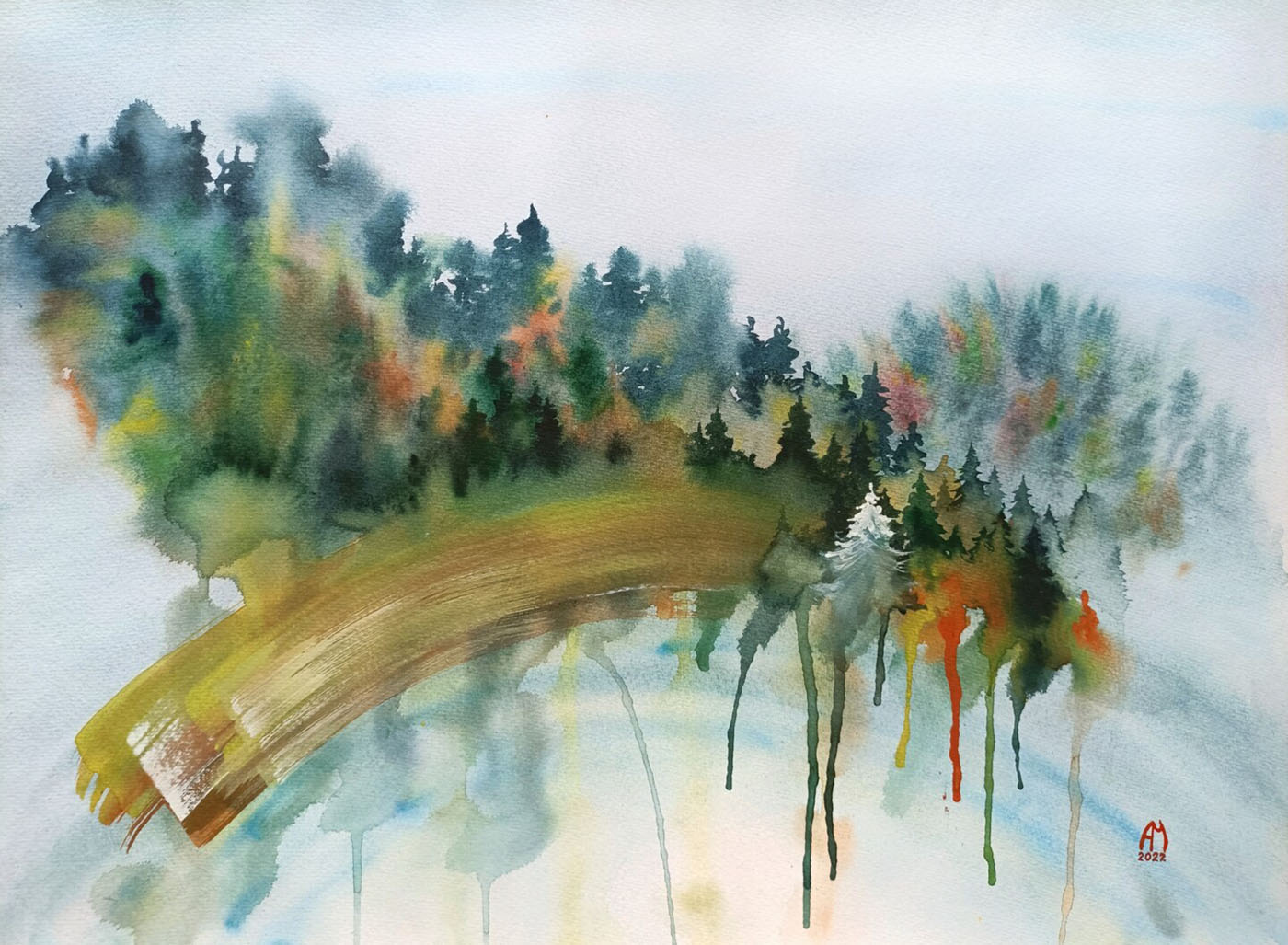
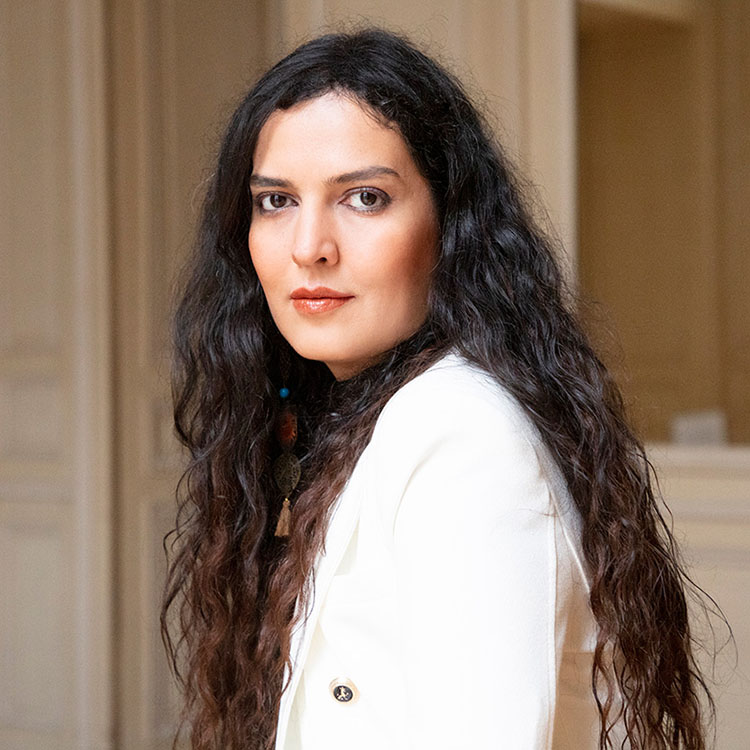
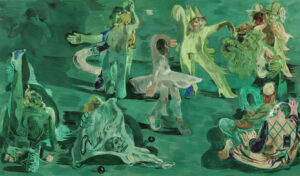

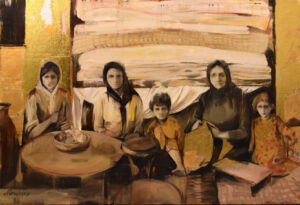
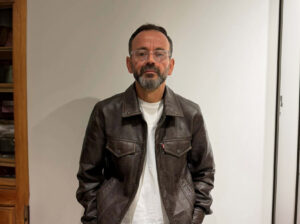
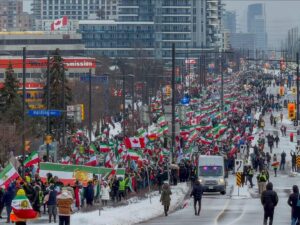
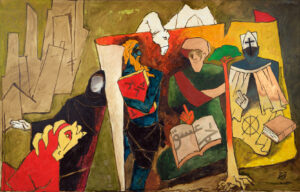
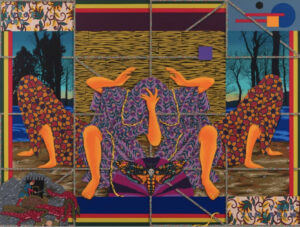
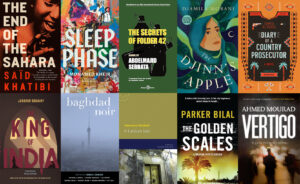
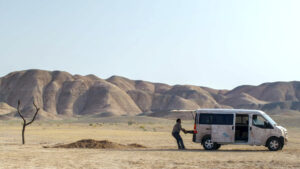


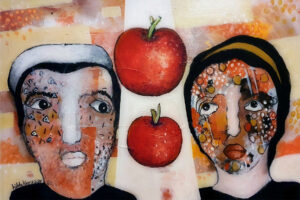
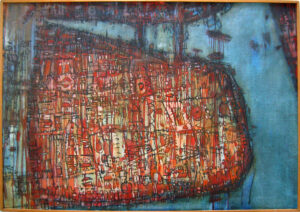
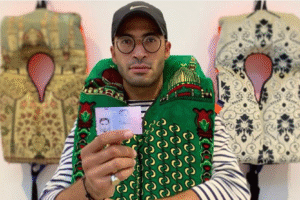

![Ali Cherri’s show at Marseille’s [mac] Is Watching You](https://themarkaz.org/wp-content/uploads/2025/09/Ali-Cherri-22Les-Veilleurs22-at-the-mac-Musee-dart-contemporain-de-Marseille-photo-Gregoire-Edouard-Ville-de-Marseille-300x200.jpg)

